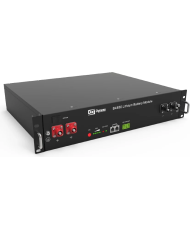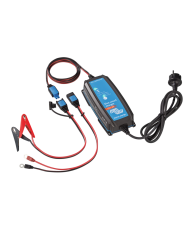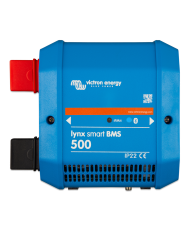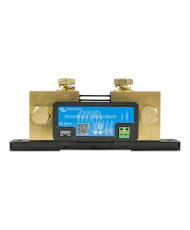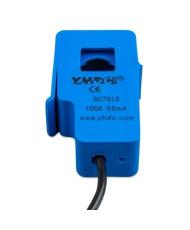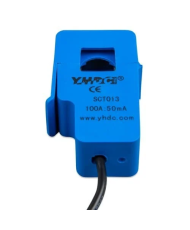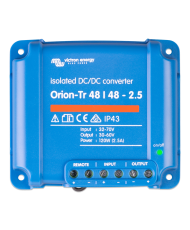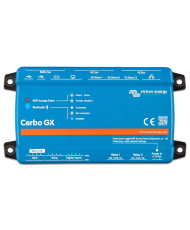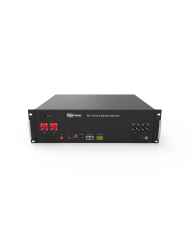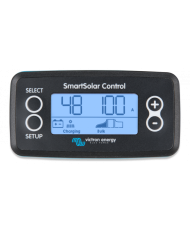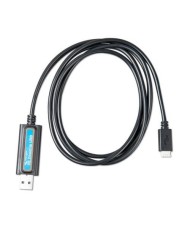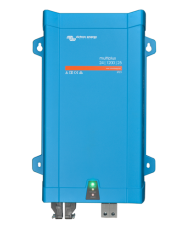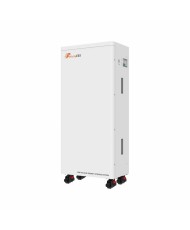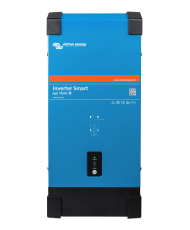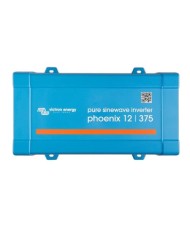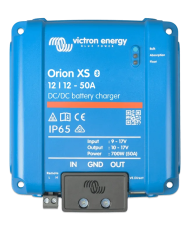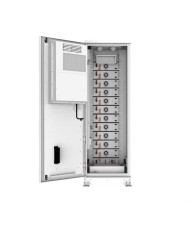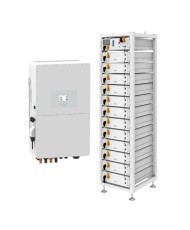The Dyness B4850 battery module is a high-performance energy storage solution, ideal for solar systems, off-grid applications and commercial solutions. With a capacity of 2.4 kWh and LiFePO4 (Lithium Iron Phosphate) technology, it provides a safe, efficient and sustainable energy source.
The Blue Smart IP65 charger can be used on vehicles such as (classic) cars; motorcycles; boats and motorhomes.
Lynx Smart BMS is an advanced battery management system dedicated to Victron Lithium Battery Smart batteries. There are various BMS options available for the Lithium Battery Smart battery series, and Lynx Smart is the most complete and equipped variant.
The SmartShunt is an all in one battery monitor, only without a display. Your phone acts as the display. The SmartShunt connects via Bluetooth to the VictronConnect App on your phone (or tablet) and you can conveniently read out all monitored battery parameters, like state of charge, time to go, historical information and much more.
Current Transformer 100A:50mA for MultiPlus-II / MultiGrid-II to implement PowerControl and PowerAssist and to optimize self-consumption with external current sensing.
Current Transformer 100A:50mA for MultiPlus-II / MultiGrid-II to implement PowerControl and PowerAssist and to optimize self-consumption with external current sensing.
Victron's Orion-48/48-2.5A (120W) galvanically isolated DC-DC converters are highly efficient devices, reaching up to 89% efficiency. They are designed to transform direct current into another direct current by changing the amplitude of the voltage.
This completely new communication center allows you to always have perfect control over your system, wherever you are, and maximize its performance. Simply connect via our Victron Remote Management (VRM) portal or access directly using a separate GX Touch 50, an MFD or the VictronConnect app, thanks to its added Bluetooth capability. This latest addition to the GX range combines the best in connectivity, redefining smart power solutions in every way.
Maximize energy production with Dynamex solar panels from 445Wp. With an efficiency of over 21.8% and an annual degradation of only 0.40%, Dynamex guarantees impressive efficiency.
You can order by phone for quantities of less than 10 pieces, with collection from our warehouses.
The price includes the green stamp.
Dyness B3 is an advanced lithium-iron-phosphate (LiFePO4) battery module designed to provide a reliable and efficient energy storage solution. With a capacity of 75Ah and a nominal voltage of 48V, this module provides a total energy of 3.6 kWh, making it perfect for use in solar energy storage systems, off-grid applications or as a backup source for various equipment.
The SmartSolar Control Display is a pluggable LCD display for the SmartSolar Charge Controllers. Simply remove the rubber seal that protects the plug on the front of the controller and plug-in the display.
The VE.Direct to USB interface connects products with a VE.Direct connection to devices with a USB port, for example a computer. With this cable it is also possible to connect more than two VE.Direct products to a single CCGX.
The MultiPlus inverter is a pure sine wave inverter, a complex battery charger and a high-speed AC switch, all in one compact housing. The Multiplus has many advanced features. The inverter takes over the supply to the connected consumers in the event of a network failure when the support power or generator power is low. This happens so quickly (in less than 20 milliseconds) that computers and other electronic equipment will continue to function without interruption.
The Lithium-Iron-Phosphate (LiFePO4) battery is the ideal solution for energy storage in photovoltaic systems, providing efficient management and supply of electricity.
The Phoenix Inverter Smart is an efficient and reliable inverter. Built on our proven and field tested Phoenix inverter platform, it now comes with a new slimmer design and full metal casing.
Created for professional services, the range of inverters for the Phoenix photovoltaic panel system fits a wide range of applications. The design criteria emphasize the creation of an inverter with sinusoidal output, with optimal efficiency, but without bringing a compromise in terms of performance.
Developed from the ground up, the Orion XS redefines battery-to-battery DC-DC charging. Ideal for dual battery systems charged with a smart alternator.
According to the EN50549-1 standard for injection into the national network
Color display and touch screen
CAN/RS485 communication port
Parallel operation function
Possibility of connecting to the generator or directing surplus solar energy
Six programmable periods for charging and discharging batteries
Operation independent of the presence of batteries
65,000W input capacity from solar panels
Output power of 50kW three-phase
Integrated WiFi module with free app
According to EN50549-1 standard for injection into the national network
Color display and touch screen
CAN/RS485 communication port
Parallel operation function
Possibility of connecting to the generator or directing surplus solar energy
Six programmable periods for charging and discharging batteries
Operation independent of the presence of batteries
65,000W input capacity from solar panels
Output power of 50kW three-phase
Integrated WiFi module with free app
According to EN50549-1 standard for injection into the national grid
Color display and touch screen
CAN/RS485 communication port
Parallel operation function for up to 10 units
Possibility of connecting to the generator or directing surplus solar energy
Six programmable periods for charging and discharging batteries
Operation independent of the presence of batteries
65,000W input capacity from solar panels
Output power of 50kW three-phase
Integrated WiFi module with free app


